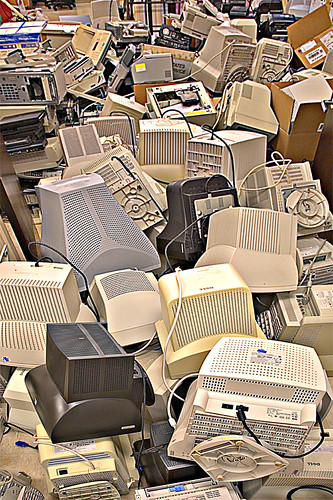
Some sci-fi-calibre developments in the world of organic robotics and nanotech this week could radically transform the way our technology looks and works, as well as how we dispose of it. A team of Chinese and Danish researchers have succeeded in growing partially organic electric nanocircuits and a team at the University of West England have designed a fully organic robot made of slime mould.
While the results of the UWE experiments look more like a plateful of boogers than anything deserving of the suffix “-bot,” project lead Andy Adamatzky explained that “plasmodium is a naturally-occurring substance with its own embedded intelligence,” and it can be trained with light, magnetic fields and substrates to be a “fully controllable and programmable” robot. The Chinese-Danish nanotech team hopes to “grow” partially organic transistors both smaller and more efficient than silicone chips.
It’s certainly weird science, but thinking of waste (as I always am), this research could also be promising in terms of creating more biodegradable, less eco-crummy electronics. I had a chat with Cientifica’s chief nanotech adviser and ardent blogger, Tim Harper, who put it this way: “What we do as a human race is quite crude—we spend a lot of time changing and fabricating things when nature has already perfected a lot with millions of years of trial-and-error. We’re just beginning to mimic and master some of those innovations.”
For more on the current predicament of electronic waste check out wasteonline’s guide to e-waste and e-recycling in the UK.
While the results of the UWE experiments look more like a plateful of boogers than anything deserving of the suffix “-bot,” project lead Andy Adamatzky explained that “plasmodium is a naturally-occurring substance with its own embedded intelligence,” and it can be trained with light, magnetic fields and substrates to be a “fully controllable and programmable” robot. The Chinese-Danish nanotech team hopes to “grow” partially organic transistors both smaller and more efficient than silicone chips.
It’s certainly weird science, but thinking of waste (as I always am), this research could also be promising in terms of creating more biodegradable, less eco-crummy electronics. I had a chat with Cientifica’s chief nanotech adviser and ardent blogger, Tim Harper, who put it this way: “What we do as a human race is quite crude—we spend a lot of time changing and fabricating things when nature has already perfected a lot with millions of years of trial-and-error. We’re just beginning to mimic and master some of those innovations.”
For more on the current predicament of electronic waste check out wasteonline’s guide to e-waste and e-recycling in the UK.
Image: Southernpixel -Flickr





No comments:
Post a Comment